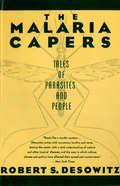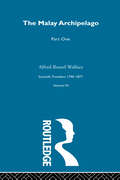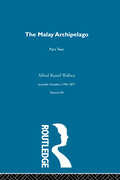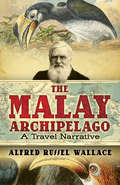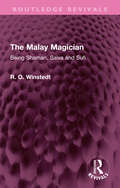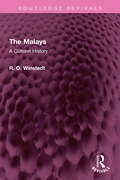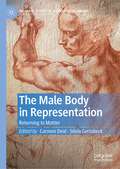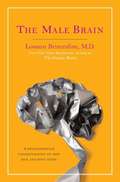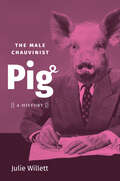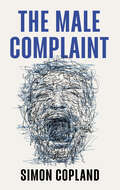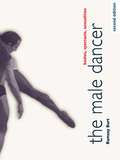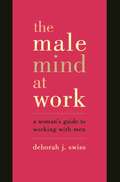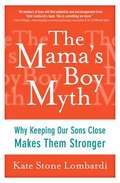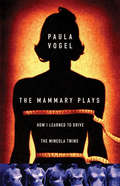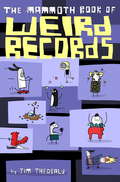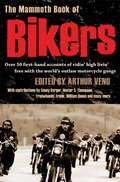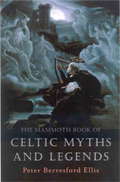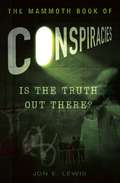- Table View
- List View
The Malaria Capers: Tales Of Parasites And People
by Robert S. Desowitz"Reads like a murder mystery…[Desowitz] writes with uncommon lucidity and verse, leaving the reader with a vivid understanding of malaria and other tropical diseases, and the ways in which culture, climate and politics have affected their spread and containment." —New York Times Why, Robert S. Desowitz asks, has biotechnical research on malaria produced so little when it had promised so much? An expert in tropical diseases, Desowtiz searches for answers in this provocative book.
The Malay Archipelago Part One: Scientific Travellers 1790-1877 Volume VII
by Alfred Russel WallaceDedicated to Charles Darwin, The Malay Archipelago- the land of the Orang-utan and the Bird of Paradise is a narrative of travel with studies of man and nature. This is part one of two volumes.
The Malay Archipelago Part Two: Scientific Travellers 1790-1877 VIII
by Alfred Russel WallaceDedicated to Charles Darwin, The Malay Archipelago- the land of the Orang-utan and the Bird of Paradise is a narrative of travel with studies of man and nature. This is part two of two volumes.
The Malay Archipelago: A Travel Narrative
by Alfred Russel WallaceWritten by a famed 19th-century scientist who laid the groundwork for much of modern biology, this influential work remains one of the great classics of natural history and travel. Detailing his eight-year exploration of the Malay Archipelago, Wallace offers observations of the native people of the island groupings, the abundant and strange animals and insects, and more.
The Malay Magician: Being Shaman, Saiva and Sufi (Routledge Revivals)
by R. O. WinstedtFirst published in 1951, The Malay Magician employs historical and comparative data to unravel the different elements – pagan, Hindu and Muslim – in a complex system of Malay magic, as it exists in the Federation of Malay in general and more specifically as it exists in the Malay States of Kelantan, Perak, Pahang, Selangor and Negri Sembilan. Tied up with the concept of magic is the Malay magician, whose many functions and roles in the society are discussed in detail. This book will be of interest to students of anthropology, sociology, history and cultural studies.
The Malays: A Cultural History (Routledge Revivals)
by R. O. WinstedtFirst published in 1961, The Malays reveals the Malay as the inheritor of an ancient and complex civilization made up of Mongolian shamanism; Assyrio-Babylonian and Tantric magic; art motifs from the steppes; Dong-so’n and India; the religions, folklore and literature of Buddhist, Hindu and Muslim; the laws of a peasantry who abandoned democracy for the feudal role of Hindu Rajas, the earthly incarnations of Indra. There are chapters dealing with the origin of the Malays and their descent from Yunnan, their social, political, legal and economic systems, their beliefs and religions and arts and crafts. This book should also be of value to all interested in history, art and the culture of India and of the Far East and to all students of Islam.
The Male Body in Representation: Returning to Matter (Palgrave Studies in (Re)Presenting Gender)
by Carmen Dexl Silvia GerlsbeckThis international and multidisciplinary volume focuses on the male body and constructions of gender in a variety of cultural productions and formats. Locating the subject matter in relevant theoretical fields, it looks at representations of male bodies in various contexts through paranoid and reparative lenses. Organized into four major sections, the contributions assembled in this book feature engaging readings of ‘non/conforming bodies’, ‘fashionable bodies’, ‘passing bodies’, and ‘pioneering bodies’ that to different degrees foreground their critical and creative potentials. In its full scope, the book acknowledges the plurality of gendered experiences and the diversity of male bodies. The Male Body in Representation: Returning to Matter adds to Cultural Studies scholarship interested in the body and gender in general and contributes to the fields of Masculinity and Body Studies in particular.
The Male Brain: A Breakthrough Understanding of How Men and Boys Think
by Louann BrizendineA breezy and enlightening guide to women and a must-read for men, this book is the eagerly awaited follow-up book that demystifies the puzzling male brain.
The Male Chauvinist Pig: A History
by Julie WillettIn the social upheavals of the 1960s and 1970s, a series of stock characters emerged to define and bolster white masculinity. Alongside such caricatures as "the Playboy" and "the Redneck" came a new creation: "the Male Chauvinist Pig." Coined by second-wave feminists as an insult, the Male Chauvinist Pig was largely defined by an anti-feminism that manifested in boorish sexist jokes. But the epithet backfired: being a sexist pig quickly transformed into a badge of honor worn proudly by misogynists, and, in time, it would come to define a strain of right-wing politics. Historian Julie Willett tracks the ways in which the sexist pig was sanitized by racism, popularized by consumer culture, weaponized to demean feminists, and politicized to mobilize libertine sexists to adopt reactionary politics.Mapping out a trajectory that links the sexist buffoonery of Bobby Riggs in the 1970s, the popularity of Rush Limbaugh's screeds against "Feminazis" in the 1990s, and the present day misogyny underpinning Trumpism, Willett makes a case for the potency of this seemingly laughable cultural symbol, showing what can happen when we neglect or trivialize the political power of humor.
The Male Complaint: The Manosphere and Misogyny Online
by Simon James CoplandInspired by leaders such as Andrew Tate and Jordan Peterson, the online Manosphere has exploded in recent years. Dedicated to anti-feminism, these communities have orchestrated online campaigns of misogynistic harassment, with some individuals going as far as committing violent terrorist attacks. Although the Manosphere has become a focus point of the media, researchers and governments alike, discussions tend to either over-sensationalize the community or offer simplistic explanations for their existence. This book uses a mixture of historical and economic analysis, alongside actual Manosphere content, to delve deeper. With The Male Complaint, Simon James Copland explains how the Manosphere has developed and why it appeals to so many men. He argues that the Manosphere is not an aberration, but is deeply embedded within mainstream, neoliberal, social structures. For a cohort of alienated men, the promise of community provides a space of understanding, connection and purpose. This insightful book dares to dig into the corners of incel communities and online spaces where misogyny thrives. It is essential reading for anyone who wants to understand, and do something about, this growing and worrying phenomenon.
The Male Dancer: Bodies, Spectacle, Sexualities
by Ramsay BurtIn this challenging and lively book, Burt examines the representation of masculinity in twentieth century dance. The Male Dancer has proven to be essential reading for anyone interested in dance and the cultural construction of gender.
The Male Mind at Work: A Woman's Guide To Winning At Working With Men
by Deborah J. SwissKnowledge is a powerful tool. The Male Mind at Work answers the troublesome and intriguing questions about how men think, feel, and behave on the job. This thought-provoking book shatters myths about what really goes on in the male mind while confirming for women the realities about gender differences that have always existed. With a focus on how to bypass difficulties smoothly, it offers clear strategies for women who feel frustrated because male colleagues speak a different language or play by different rules.
The Mama's Boy Myth
by Kate Stone LombardiA radical reexamination of the mother-and-son relationship that advocates the end of the "mama's boy" taboo. Mothers get the message early and often--push your sons away. Don't keep them emotionally bound to you. Back off, because boys need to learn to stand on their own. It is as if there were an existing playbook--based on gender role preconceptions dating back to Freud, Oedipus, and beyond--that prescribes the way mothers and their sons should interact. Kate Stone Lombardi, an award-winning journalist who has written for the New York Times for more than twenty years, persuasively argues that much of the entrenched "wisdom" about mothers and sons is hopelessly outdated. Highlighting new research, The Mama's Boy Myth reveals that boys who are close to their mothers are happier, more secure, and enjoy stronger connections with their friends and ultimately their spouses. With revealing interviews and moving case studies, Lombardi argues that the rise of the new male--one who is more emotionally intelligent and sensitive without being less "manly"--is directly attributable to women who reject the mama's boy taboo.
The Mammary Plays
by Paula VogelThe Mineola Twins and How I Learned To Drive are mirror-image family plays about coming of age in the '60s. The Mineola Twins, primarily set on Long Island, New York, is the more fiercely comic and political of the two. How I Learned To Drive, set mostly in Maryland, is a more delicate tale of sexual awakening.
The Mammoth Book Of Skulls: Exploring the Icon – from Fashion to Street Art (Mammoth Books #281)
by ILYASkulls have always captured the human imagination. This extraordinary collection of the most engaging and intriguing images of the skull from pop culture around the world, presents a visual feast of the ultimate doom-laden image. Here you will find the skull in graphic novels, manga, graphic design, art, costume, make-up, vintage advertising and popular culture, along with the just plain weird.Page after page of stunning photographs reveal an incredible diversity of interpretations of the iconic image.
The Mammoth Book Of Weird Records (Mammoth Bks.)
by Jim TheobaldEveryone?s heard of Usain Bolt, but how many people know about Dineka Maguire? Like Bolt, the Irish woman is a world record holder but in the rather lesser known sport of bog snorkelling. She is just one of the hundreds of unsung heroes featured in this book chronicling the people who go to bizarre lengths to break world records in the weirdest categories; people who devote hours of intense training to spitting dung, eating cockroaches, sniffing feet or tossing tuna in the hope of one day being recognised as the best in the world. This astonishing compendium of the weirdest, wackiest and most disgusting world records will amuse and astound in equal measure.Entries include:Longest ear hairFastest marathon while wearing a deep-sea diving suitFastest bog snorkellerFarthest distance skateboarding by a goatMost bees on bodyMost milk crates balanced on head Fastest 5-km run while dressed as a penguin and jugglingHeaviest airplane pulled with teethFastest shopping trolleyLongest backwards motorcycle rideMost stairs climbed by bicycleFastest 30 metres on a scooter by a dogFirst water-skiing squirrel
The Mammoth Book Of Weird Records (Mammoth Books #452)
by Jim TheobaldEveryone’s heard of Usain Bolt, but how many people know about Dineka Maguire? Like Bolt, the Irish woman is a world record holder but in the rather lesser known sport of bog snorkelling. She is just one of the hundreds of unsung heroes featured in this book chronicling the people who go to bizarre lengths to break world records in the weirdest categories; people who devote hours of intense training to spitting dung, eating cockroaches, sniffing feet or tossing tuna in the hope of one day being recognised as the best in the world. This astonishing compendium of the weirdest, wackiest and most disgusting world records will amuse and astound in equal measure.Entries include:Longest ear hairFastest marathon while wearing a deep-sea diving suitFastest bog snorkellerFarthest distance skateboarding by a goatMost bees on bodyMost milk crates balanced on head Fastest 5-km run while dressed as a penguin and jugglingHeaviest airplane pulled with teethFastest shopping trolleyLongest backwards motorcycle rideMost stairs climbed by bicycleFastest 30 metres on a scooter by a dogFirst water-skiing squirrel
The Mammoth Book of Bikers: Over 40 first-hand accounts of riding high, living free, with the world's outlaw motorcycle gangs
by Arthur VenoThe definitive collection of first-hand accounts of the world's outlaw motorcycle gangs Outlaw bikers consider themselves 'the last free people in society', unconstrained by the regulations that rule ordinarycitizens. And they guard their privacy jealously. Drawing on 17 years of studying and participating in biker culture, Arthur Veno has compiled the ultimate collection of original biker writing. Here are insider accounts of landmark incidents in bike folklore, plus reprints of classic writing from biker-originated magazines, handouts, websites and books. Gangs featured include the Bandidos, Hells Angels, Henchmen MC, the Outlaws, the Mongols, Annihilators, the Diablos, Gypsy Jokers, the Rebels, the Straight Satans, and the Vagos. And with contributors such as Freewheelin' Frank (one-time secretary of Hells Angels), Edward Winterhalder (among the most powerful members of the Bandidos), and Sonny Barger (founder of the Hell's Angels).Also included are those rare accounts by outsiders that have managed successfully to 'look in' on the gangs: including Hunter S. Thompson in his 'Hell's Angels - A Strange and Terrible Modern Saga'; William Queen the undercover agent who infiltrated America's violent outlaw motorcycle gang the Mongols; and Daniel R. Wolf's account of riding with the Rebels.
The Mammoth Book of Bikers: Over 40 first-hand accounts of riding high, living free, with the world's outlaw motorcycle gangs (Mammoth Books #464)
by Arthur VenoThe definitive collection of first-hand accounts of the world's outlaw motorcycle gangs, with contributions by Sonny Barger, Hunter S. Thompson, Ed Winterhalder, William Queen and many moreOutlaw bikers consider themselves 'the last free people in society', unconstrained by the regulations that hem in ordinary citizens. And they guard their privacy jealously. Drawing on seventeen years of studying and participating in biker culture, the author has compiled this one-of-a-kind collection of original biker writing.Here are insider accounts of landmark incidents in biker folklore, including reprints of classic writing from biker-originated magazines, handouts, websites and books. Gangs featured include the Bandidos, the Hells Angels, Henchmen MC, the Outlaws, the Mongols, the Annihilators, the Diablos, the Gypsy Jokers, the Rebels, the Straight Satans and the Vagos. And with contributors such as Freewheelin' Frank (one-time secretary of the Hells Angels), Edward Winterhalder (among the most powerful members of the Bandidos) and Sonny Barger (founder of the Hells Angels). Also included are those rare accounts by outsiders who have succeeded in 'looking in' on the gangs: Hunter S. Thompson's Hells Angels: A Strange and Terrible Modern Saga; writing by William Queen, the undercover agent who infiltrated America's violent outlaw motorcycle gang the Mongols; and Daniel R. Wolf's account of riding with the Rebels.
The Mammoth Book of Celtic Myths and Legends (Mammoth Books #196)
by Peter EllisDeveloped from an early oral storytelling tradition dating back to the dawn of European culture, this is one of the oldest and most vibrant of Europe's mythologies. From all six Celtic cultures - Irish, Scots, Welsh, Cornish, Manx andBreton - Peter Berresford Ellishas included popular myths and legends, as well as bringing to light exciting new taleswhich have been lying in manuscript form, untranslated and unknown to the modern general reader.The author brings not only his extensive knowledge of source material but also his acclaimed skills of storytelling to produce an original, enthralling and definitive collection of Celtic myths and legends - tales of gods and goddesses, heroes and heroines, magical weapons, fabulous beasts, and entities from the ancient Celtic world.
The Mammoth Book of Celtic Myths and Legends (Mammoth Books)
by Peter EllisDeveloped from an early oral storytelling tradition dating back to the dawn of European culture, this is one of the oldest and most vibrant of Europe's mythologies. From all six Celtic cultures - Irish, Scots, Welsh, Cornish, Manx andBreton - Peter Berresford Ellishas included popular myths and legends, as well as bringing to light exciting new taleswhich have been lying in manuscript form, untranslated and unknown to the modern general reader.The author brings not only his extensive knowledge of source material but also his acclaimed skills of storytelling to produce an original, enthralling and definitive collection of Celtic myths and legends - tales of gods and goddesses, heroes and heroines, magical weapons, fabulous beasts, and entities from the ancient Celtic world.
The Mammoth Book of Conspiracies (Mammoth Books #369)
by Jon E. LewisBang up to date with fresh cover-ups relating to Barack Obama, Michael Jackson and AfghanistanThe 100 military, medical, religious, alien, intelligence, banking and historical cover-ups 'they' really don't want you to know about: The Military-Industrial Complex's fomentation of war with Iraq; the construction of concentration camps in the United States by FEMA (the Federal Emergency Management Agency); the use of alien 'Foo Fighters' by the Nazis and the Japanese during the Second World War; the miracle natural drug suppressed by Big Pharma; the Israelis' responsibility for the bombing of USS Cole; the real reason why CERN broke down; the murder of Paul McCartney - and you didn't even know he was dead. Entertainingly written and closely documented, The Mammoth Book of Conspiracies uncovers the 100 most secret cover-ups in an accessible A-Z format. It covers 95 new conspiracies even more fiendish than those detailed in The Mammoth Book of Cover-Ups by the same author, and provides fresh revelations regarding the five furthest-reaching conspiracies in that book, including the assassination of JFK and 9/11. The book includes a full bibliography and introduction.
The Mammoth Book of Conspiracies: The 100 Most Terrifying Conspiracies Of All Time (Mammoth Ser.)
by Jon E. LewisBang up to date with fresh cover-ups relating to Barack Obama, Michael Jackson and AfghanistanThe 100 military, medical, religious, alien, intelligence, banking and historical cover-ups 'they' really don't want you to know about: The Military-Industrial Complex's fomentation of war with Iraq; the construction of concentration camps in the United States by FEMA (the Federal Emergency Management Agency); the use of alien 'Foo Fighters' by the Nazis and the Japanese during the Second World War; the miracle natural drug suppressed by Big Pharma; the Israelis' responsibility for the bombing of USS Cole; the real reason why CERN broke down; the murder of Paul McCartney - and you didn't even know he was dead. Entertainingly written and closely documented, The Mammoth Book of Conspiracies uncovers the 100 most secret cover-ups in an accessible A-Z format. It covers 95 new conspiracies even more fiendish than those detailed in The Mammoth Book of Cover-Ups by the same author, and provides fresh revelations regarding the five furthest-reaching conspiracies in that book, including the assassination of JFK and 9/11. The book includes a full bibliography and introduction.
